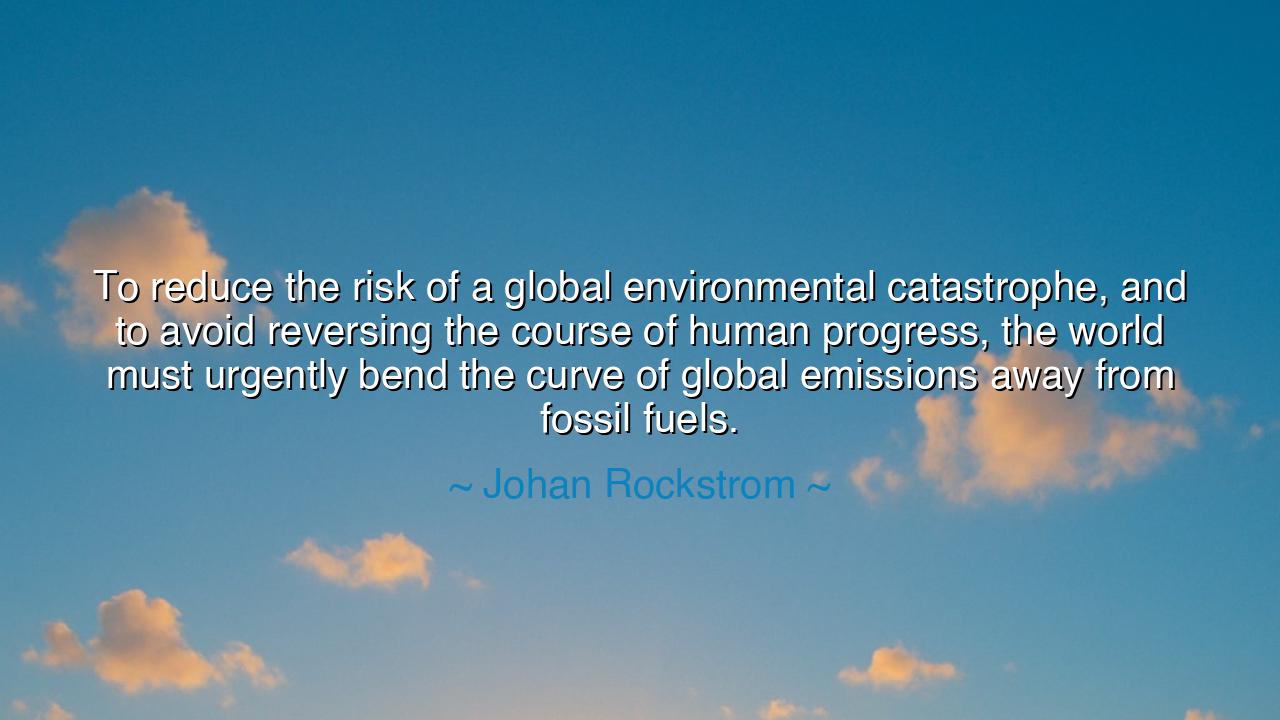
To reduce the risk of a global environmental catastrophe, and to
To reduce the risk of a global environmental catastrophe, and to avoid reversing the course of human progress, the world must urgently bend the curve of global emissions away from fossil fuels.






Hear the urgent cry of Johan Rockström, who gazed upon the state of the earth and spoke with the clarity of a prophet: “To reduce the risk of a global environmental catastrophe, and to avoid reversing the course of human progress, the world must urgently bend the curve of global emissions away from fossil fuels.” In these words lies not only scientific reasoning, but a moral summons to humanity. For he speaks of nothing less than the survival of civilization itself, and of the duty of this generation to preserve the inheritance of the earth.
The heart of his teaching is the call to bend the curve of global emissions. The curve is the line of our choices, rising steadily with each ton of carbon poured into the air, each forest felled, each flame of coal and oil consumed. Left unbent, this curve points only to ruin—rising seas swallowing cities, storms of fury unceasing, lands once fertile turned to desert, and species vanishing like shadows at dusk. To bend the curve is to change the destiny of our age, to wrestle the path of progress away from destruction and toward renewal.
Rockström names the enemy plainly: fossil fuels. These ancient stores of energy, born of dead forests and seas of past ages, gave humanity the power to shape the modern world. They lit our lamps, moved our machines, and carried us across oceans and skies. Yet their gift was poisoned. For each spark brought with it invisible smoke that cloaks the earth, warming it beyond balance. What once seemed a blessing now reveals itself as a curse. His call is to cast off this dependence before it consumes us all.
History itself offers warning. Recall the fall of Easter Island, where a flourishing people felled their forests for monuments, fuel, and expansion. In their hunger for progress, they consumed the very resources that sustained them. Their society collapsed into ruin, their monuments standing as silent witnesses to folly. Today, the earth itself risks becoming a larger Easter Island, unless we heed Rockström’s warning and turn from the path of unchecked consumption.
Yet his words are not despair, but hope. For to bend the curve is not to abandon progress, but to save it. Renewable energies—wind, sun, water, and the ingenuity of human innovation—offer the means to sustain both the earth and civilization. The story of nations shifting to solar power, of communities powered by clean energy, of industries reimagining their work, shows us that change is possible. The curve is not fate; it is shaped by our hands, and in our hands lies the power to bend it.
The lesson is clear: human progress is not measured only in inventions, but in wisdom—the wisdom to know when the old path must be abandoned for the sake of life. True progress is not the endless burning of what is finite, but the harmony of creation and invention together. Rockström warns us that to ignore this truth is to undo centuries of advancement, to reverse the course of history itself, and to plunge into an age of suffering and decline.
Practical action flows from this wisdom. Turn your household, your community, your nation toward renewable energy. Demand that leaders act with courage, not delay. Live with restraint, reduce waste, and honor the earth not as an endless resource but as a sacred trust. Support innovation that heals rather than harms. And above all, remember that the time is not tomorrow, but now—urgency is the word, for the curve grows steeper with each passing year.
Thus, Johan Rockström’s words must be carried as a banner for all generations: that to bend the curve away from fossil fuels is to protect not only the earth, but humanity itself. Let us be the generation that chooses wisdom over folly, courage over apathy, and life over destruction. For if we heed his call, we may yet write a future of balance, where the earth flourishes and human progress continues—not reversed, but renewed.






AAdministratorAdministrator
Welcome, honored guests. Please leave a comment, we will respond soon